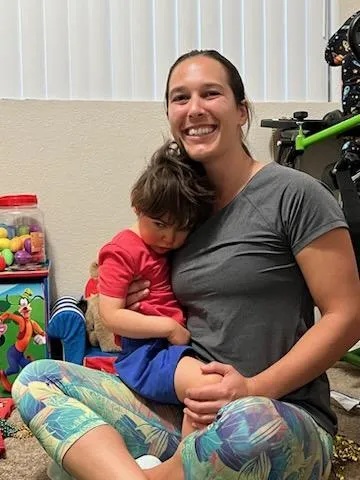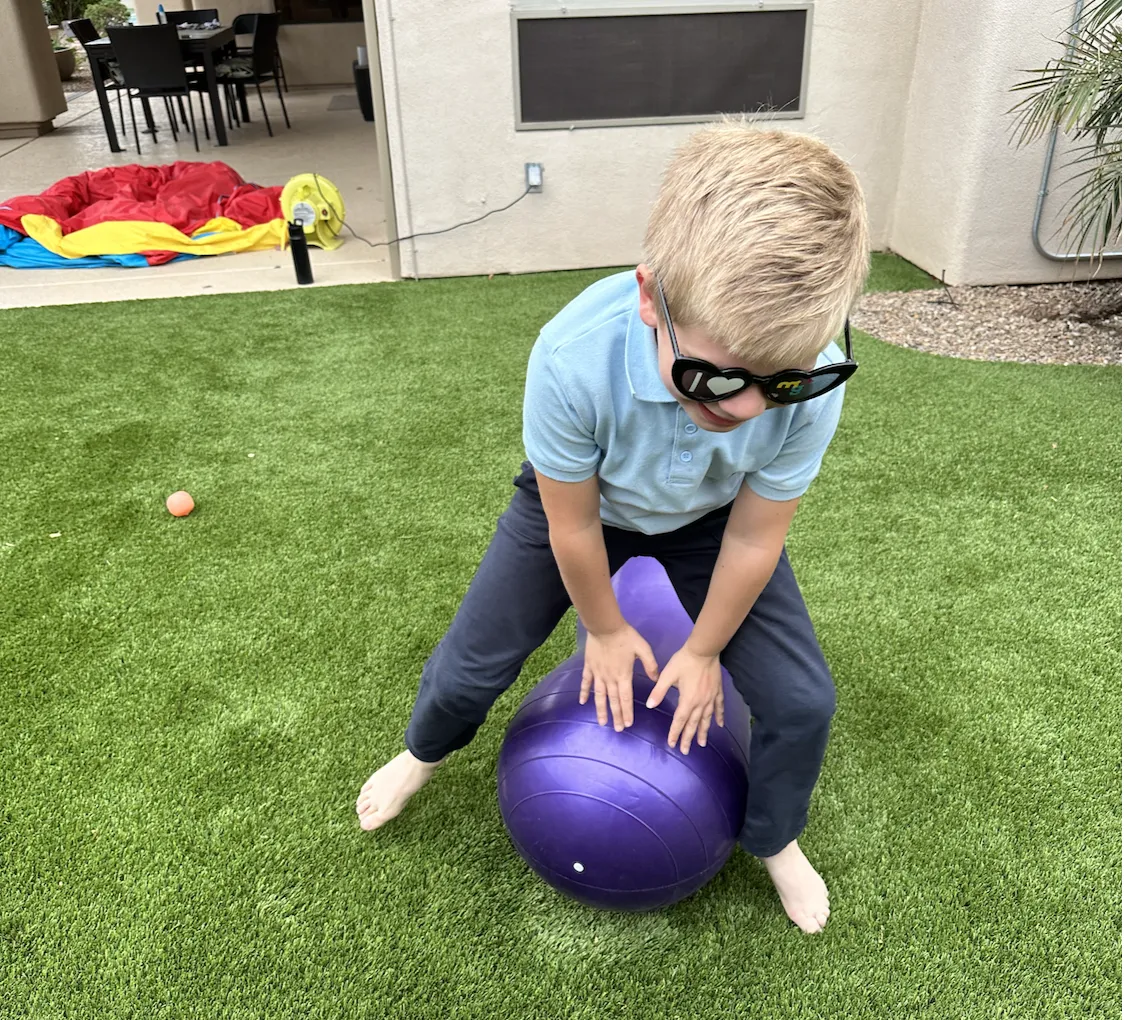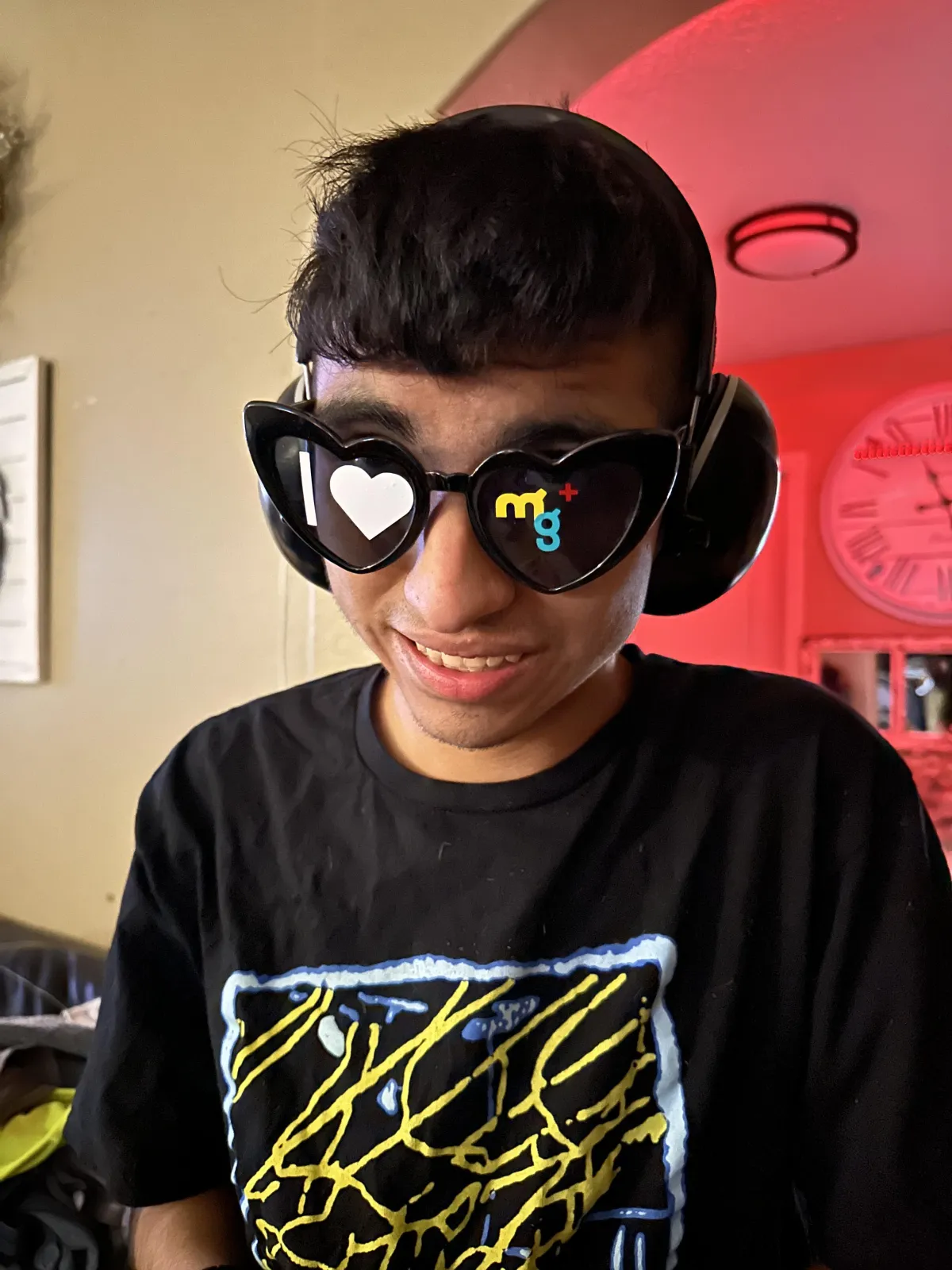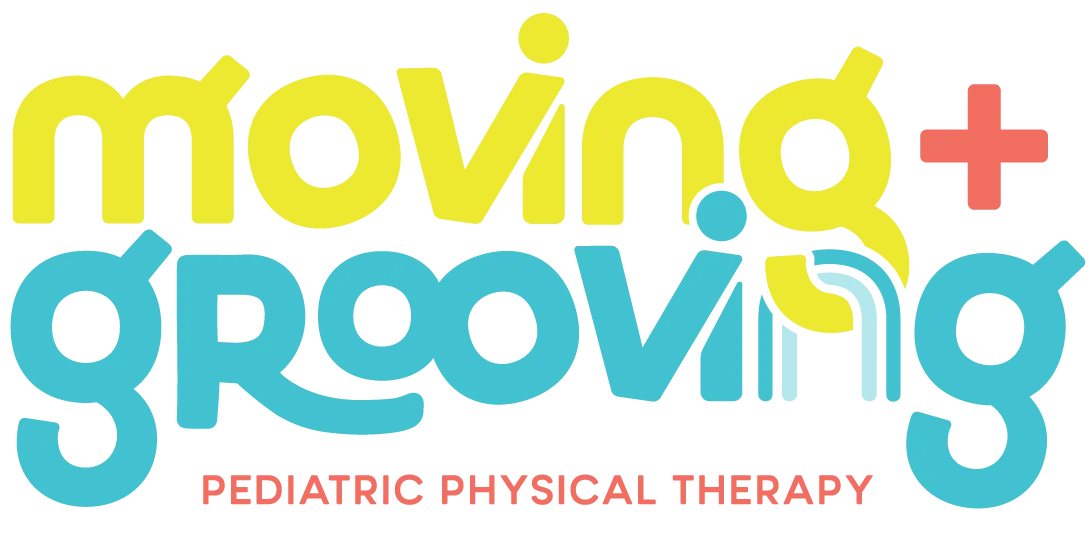Frequently Asked Questions
What Makes Us Different
We know you have questions when it comes to finding the perfect fit for your child's physical and occupational therapy needs.
With our help, you'll go from worrying about their safety or seeing them struggle with daily tasks to proudly posting about their new skills and going on family outings together.
Soon, you'll be signing up for new extracurriculars, without the stress and behaviors you encountered before!
Here's just a few reasons why our past and current clients have chosen & stuck with us.
We tailor each session specifically to you and your child based on their current status and recent updates; no cookie cutter approaches here.
Our sessions are up to 25-33% longer than other therapy providers.
We don't agree to see just anyone, of any age; we are experts in pediatric physical and occupational therapy, and only accept pediatric patients, or adults with disabilities developed in childhood.
We utilize the best ways to motivate your child because we take the time to get to know your child.
We document your child's progress with photos and videos to easily track progress. We'll even send you a direct link so that you can revel in their success and show off their skills to family and friends!
We focus on quality over quantity; we teach you and your child the best form to practice for the best long-term outcomes.
You'll receive the direct phone number to your treating therapist to ask questions in between appointments, rather than wait for days for a response in a portal.

Your child will have the same therapist rather than be greeted by a new face each visit, without warning.
We do our best to accommodate schedule concerns or requests. Yes, this includes after school spots and nap times.
We have a real person answer the phone rather than a virtual answering service or keeping you on hold for hours on end.
We don't spend an entire session writing a progress note, without providing actual therapy.
We provide compassionate, judgment-free support; we're not here to 'fix' your child, but rather to help them be as independent and functional as possible.
We track their progress on objective, standardized assessments to see how they are performing in relation to peers as we move forward with their therapy.
We have personal connections with other referral sources to ensure your child's needs outside of therapy are met.
We treat newborns to adults with disabilties

Why Choose Us
At Moving and Grooving Pediatric PT, we help children reach developmental milestones through fun, play-based physical and occupational therapy.
Our experienced, pediatric-trained therapists empower parents with the tools and education to support their child’s growth. With flexible in-home and online options, we fit into your busy schedule. Yes, that means we even offer after school appointments!
When you choose us, you gain expert guidance, convenience, and peace of mind. You have someone on your team who believes in and supports you, not second-guessing your expertise as a parent.
Your child deserves the highest quality care, with direct access to your therapist beyond scheduled sessions.
We’ve have many trusted pediatric professionals throughout the Phoenix metro area who recognize the difference in our approach.
Numerous families have found us after using another provider, and start seeing results in days to weeks—rather than months.

QUOTES FROM REAL PATIENTS BELOW!
"You are the best PT that he's had in the past 4 years."
"You're worth every penny."
"You're our favorite therapist [out of many]!"
"We've seen more progress with you in just a few months than we did in years at [clinic]."
"We tell everyone about you! You've helped [him] reach these important milestones and we would be lost without you! We especially love that we can reach out with questions about containers, etc. and you help guide us."
"You're really great at what you do. I hope you know that."
"Thank you so much for taking the time out of your day to come say hi! It really touched my heart to see how much you care even after all this time :) You truly have such a wonderful heart and we are so lucky and thankful to have crossed paths with you!"
"He loves you so much! You always make therapy fun and exciting!"
Call us to see how we can support your needs.
Want more proof? Visit us on Yelp and Google to see our 110, outstanding 5* reviews!
Frequently Asked Questions
Question 1: When and how can we get started?
Please contact us here or you can call or text us at 480-269-0173 to inquire about the earliest openings. We currently have limited availability for virtual and in-home physical and occupational therapy appointments. There is no waitlist for Confident Beginnings.
Question 2: What experience do you have?
Please learn more about our expert pediatric therapists here. All of our therapists are have worked in clinical and teaching environments, helping a variety of patients of all ages. Although Moving & Grooving Pediatric PT was established in 2022, Dr. Nikki has over 10 years of experience as a doctor of physical therapy. She has worked in early intervention/ AZEIP, outpatient, aquatic therapy, skilled nursing (SNF) & home health settings. As a result, she has learned many different techniques & skill sets, collaborated with many other pediatric experts & understands the importance of teaching caregivers what to do outside of their therapy sessions. She also previously taught pediatric physical therapy to doctoral students at Midwestern University.
Question 3: Why should we choose you?
At Moving & Grooving PT, you'll receive the very best..... the best therapists, treatment, intervention, and dedication. We value our patients so much that we give out our cell phone numbers to be reached at any point between appointments. We offer in home and virtual appointments to make it easy for your child to succeed. We help the child by also empowering the family members with activities to practice and techniques to master when we're not there. There is no guessing as to which therapist your child will see for their scheduled therapy; whichever one you are assigned, you will see consistently. Your therapists will engage in a variety of interventions & suggest other activities to see what works best for your child if they're struggling to participate or make progress. We will only schedule you for an evaluation if we can fit you in for ongoing appointments after; this is generally not the case at larger therapy companies. Finally, our evaluations are 75 minutes and our sessions are 60 minutes; most other pediatric therapy locations offer 30-45 minute appointments.
We are a 5* agency; the best of the best in Scottsdale, AZ! Not only should you not settle for a long wait list, but you shouldn't settle for brand new therapists, nor a rotating staff to see your child. We have high quality interventions that have been shown to provide amazing results & attend ongoing trainings to stay up to date with the best practices. Our past & current patients have seen how much we truly care & how much progress their child makes in our care, as compared to competitors. Actual quotes from our patients include, "You've completely changed our lives since working with [our son]," "We have seen more progress in a few weeks with you than in the 2 years we spent going to [other clinic]." "You are truly amazing at what you do, I hope you know that!" "You are worth every penny." "I can't believe how quickly she did it on her own after you left," "Thanks for all you helped us with! He's doing so good thanks to you!" "We don't know what we would have done without your help!" "I'm so glad that we found you!" "We would have never known our child has [cerebral palsy, hip dysplasia, genetic condition] without your expertise, and we are so grateful for that."
Question 4: Do you accept my insurance?
Yes; but your child deserves the best, regardless of your insurance plan. No more waiting days for portal replies, sitting on hold for hours, or battling automated insurance systems—when you book with us, support is personal, timely, and stress-free. We'll let you know what's covered when you schedule your child's visit.

Question 5: Did I do something wrong to cause my child to be delayed?
Absolutely not. Your child's development is multi-faceted, and they develop in different ways than you, their siblings, or their peers. This can be due to a variety of factors, but please know that you are not the cause for your child's diagnosis or being behind with their milestones. At Moving & Grooving Pediatric PT, we are big believers on shifting our mindset to being more positive & optimistic. We focus on what you can do moving forward, rather than what you could have done differently before; none of us are perfect. We love sharing resources with our families to ensure they know what they can do to help their child even more. You're doing the best you can with the information you have, and the love and dedication you're pouring into your child currently is an amazing foundation!
A child can require therapeutic intervention for a variety of reasons, and it is almost always multi-dimensional, and out of your hands. What's important is knowing that you did your best with the information and knowledge you had at the time, and you're now adding more interventions to help your child succeed even more. We're here to help you on the path forward and hope that you'll let us lead you this way rather than staying stuck on the path to the past.
Question 6: Do you have children of your own?
While our therapists don’t have children of their own, they love being around kids—whether that’s friends’ children, nieces and nephews, or the many little ones they work with in their professional roles. They’re also proud pet parents, bringing that same compassion and care into the relationships they build with families.
Question 7: What is early intervention, and how does it help my child?
Early intervention denotes the provision of services and support for infants and children under 3 years of age experiencing delays or problems in development. Early intervention can have a significant, positive impact on your child's development and might even decrease your child's likelihood of needing special education services during his or her life. Free early intervention services through the state (AZEIP, https://des.az.gov/azeip) are only provided to children in the lowest 2% of development in the state of Arizona. AZEIP is a parent coaching program centered around your concerns as a parent rather than what the therapist suggests targeting. Many families who use AZEIP like to supplement with private therapy as well, as AZEIP is solely a coaching program, as private therapy provides more specific hands on techniques.
Question 8: How can I prevent my baby from developing a flat head (plagiocephaly)?
Plagiocephaly can be developed in utero (while you’re pregnant), during a prolonged delivery, or after birth. To help prevent plagiocephaly, your baby needs plenty of time off of their back when awake; this can include tummy time or side-lying. You should switch the side you hold your baby on when feeding and switch the position of your baby's head when they sleep. If you are noticing flat spots or asymmetry on your baby’s head and have already been working with a physical therapist or occupational therapist, your baby may need a DOC band. They are a very effective tool to treat plagiocephaly and are absolutely adorable, particularly when customized with artwork. You can schedule a consultation with Cranial Technologies, as they are our preferred vendor.
Question 9: Why does my baby hate tummy time, and how can I make it easier?
Many babies dislike tummy time when they are first introduced to it; it’s new, it’s away from mom, and it requires a lot of strength. Babies need to first develop head and neck control and understand that they have arms to have more success with tummy time. Sometimes babies struggle with tummy time due to reflux, as the extra pressure is uncomfortable on their stomach. If your baby hates tummy time, start with very short, yet frequent sessions. You can have them on your chest to start. We suggest making it more fun by getting on the floor with them and making it a sensory-filled experience through different items to look at, listen to and touch. If your baby skips spending time on their tummy, it can lead to complications and delays later on, so we highly suggest getting help to make this more enjoyable for them ASAP. We encourage you to check out Confident Beginnings where we support you with these questions and concerns.
Question 10: How old should my baby be to start crawling?
Babies usually start crawling between 8-9 months. Crawling is a crucial milestone that helps babies prepare for walking, reading & feeding. They generally master this skill through many hours of tummy time. This leads to army crawling, rocking on hands and knees, pushing backwards, and then crawling forward on hands and knees. If your child crawls in a way other than on their hands and knees, this could indicate an unintegrated primitive reflex, weakness, or lack of coordination. We highly recommend seeking an evaluation with a physical therapist or occupational therapist if your baby is not yet crawling and is 9 months old.
Question 11: Is toe walking typical?
Occasional toe walking can be seen in very new walkers, particularly if they are unable to see over a piece of furniture, but persistent toe walking may require evaluation by a pediatric physical or occupational therapist. If left untreated, it may lead to long term pain & instability, and require surgical intervention.
Question 12: What are the signs of unintegrated/retained primitive reflexes in children?
Retained primitive reflexes are commonly seen in children who had a c-section delivery, struggled with tummy time, skipped crawling, and are delayed in their social emotional processing. They present with overall delays, difficulty in school (reading and writing), poor balance, involuntary movements, bed wetting, and issues with coordination. See our blog for more information.
Question 13: How can I teach my baby to walk?
Walking is the milestone most sought after for parents. The appropriate range for independent walking is 11-15 months, and toe walking is not a typical stage of walking. Before a child can walk, they must have sufficient strength, balance, stability & confidence in themselves. This is taught through mastery of prior milestones and free play outside of containers, allowing them to explore and trial new transitions and movements. Encourage cruising along furniture, provide push toys for support, keep them in a standing position for longer intervals, and create soft, safe spaces to explore. Always supervise your baby during these activities and provide incentive to take on this new challenge.
Question 14: What are some signs that might indicate a child has autism?
Autism (ASD) is a spectrum of disorders that is caused by a combination of genetics and the environment. People with ASD can live independently and have fulfilling lives. Red flags can include no eye contact, delayed motor milestones and speech, repetitive behaviors (such as hand flapping), and limited social interaction. Children with ASD are often content playing by themselves rather than reciprocally with others and tend to play with toys in one manner, such as throwing, stacking, or sorting. Routines are also important to follow. Children with ASD often prefer to sit in a ‘w’ position, walk on tiptoes, struggle with ball sports, and have limited body awareness. These behaviors and physical difficulties can be addressed through a variety of professionals, including occupational and physical therapy. If you have concerns about your child, we recommend setting up an appointment with a developmental pediatrician or other healthcare provider, such as our local providers Insight Psychology (link: https://www.insightpsychology.health/autism) or Developmental Behavioral Pediatrics AZ (https://developmentalbehavioralpediatricsaz.com/services/). There are also many other programs available to support ASD, such as AZEIP (state funded early intervention, https://des.az.gov/services/developmental-disabilities/early-intervention/refer-a-child-to-azeip) & ABA (applied behavior analysis, https://www.autismspeaks.org/applied-behavior-analysis).
Question 15: How can I find a pediatric PT/OT in Scottsdale without having to be on the wait list?
Look into local clinics, ask your pediatrician for recommendations, and even private practices that may not have as long of a waiting period as others. We currently don’t have a wait list and would love to help your child. You are welcome to schedule a free consultation first or move forward with the initial evaluation. Contact us here.
Question 16: What are some activities that will improve coordination in children?
Obstacle courses, ball games, dancing, and appropriate sports can be done in every age group. If your child has difficulty after practicing these, it may be helpful to seek guidance from a physical therapist or occupational therapist to see if there is an underlying issue making coordination more difficult. See our posts on unintegrated/retained primitive reflexes, developmental coordination disorder, and Autism/ ASD.

Follow Us
Follow Us
Confident Beginnings is our month-by-month development coaching program for your baby's first 18 months. It bridges the gap between your questions and rushed pediatrician appointments.
Confident Beginnings is available for families worldwide for parents of children 0-18 months old.
Services
More
Contact Us
Monday - Friday: 8:00 am - 5:00 PM
8603 E. Royal Palm Rd. #120, Scottsdale, AZ 85258
In home and virtual pediatric PT + OT services in Scottsdale, AZ + surrounding areas.
© Copyright 2026. Moving and Grooving Physical Therapy. All rights reserved. Sitemap. Privacy Policy